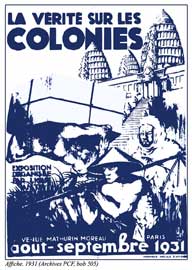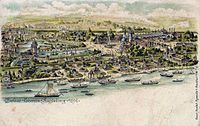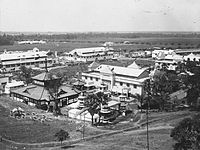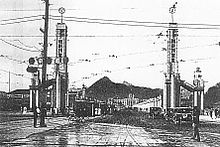Colonial exhibition














A colonial exhibition was a type of international exhibition that was held to boost trade. During the 1880s and beyond, colonial exhibitions had the additional aim of bolstering popular support for the various colonial empires during the New Imperialism period, which included the scramble for Africa.
The first colonial exhibition, in Victoria, Australia, in 1866, was the progeny of 25 years of similar exhibitions held in Melbourne, in which other colonies within the Australian continent participated.
Perhaps the most notable colonial exhibition was the 1931 Paris Colonial Exposition, which lasted six months and sold 33 million tickets.[1] Paris's Colonial Exhibition opened on 6 May 1931 on 110 hectares (272 acres) of the Bois de Vincennes. The exhibition included dozens of temporary museums and façades representing the various colonies of the European nations, as well as several permanent buildings. Among these were the Palais de la Porte Dorée, designed by architect Albert Laprode, which then housed the Musée permanent des Colonies, and serves today as the Cité nationale de l'histoire de l'immigration.[1]
The French Communist Party held an anti-colonial counter-exhibition near the 1931 Colonial Exhibition, titled The Truth About the Colonies. The first section was dedicated to crimes during the colonial conquests, and quoted Albert Londres and André Gide's criticisms of forced labour. The second one contrasted the Soviet Union's "nationalities policy" with "imperialist colonialism".
Germany and Portugal also staged colonial exhibitions. Human zoos were featured in some of the exhibitions, such as the Parisian 1931 exhibition.[2]
The Empire of Japan hosted colonial showcases in exhibitions within the Home Islands, but also held several full-scale expositions inside its colonies of Korea and Taiwan. These exhibitions had objectives comparable to their European counterparts, highlighting economic achievements and social progress under Japanese colonial rule to Japanese and colonial subjects alike.

Brussels was the venue for the last colonial exhibition: the Belgian Foire coloniale, held in 1948.
Colonial exhibitions
Exhibitions that may be described as colonial exhibitions include the following.

Notes
- ^ Exhibitions in Australia started 25 years earlier, when the colonies of Victoria and New South Wales, inspired by the 1851 Great Exhibition in London, mounted their own exhibitions in 1854 in preparation for the Paris Exhibition of 1855 and in 1861 for the London Exhibition of 1862. These earlier exhibitions were known as Metropolitan Intercolonial Exhibitions: "intercolonial" referring to the Australian colonies that became states of Australia after federation in 1901, not those in separate countries of the British Empire.[3]
- ^ The exhibition celebrated the Entente Cordiale signed in 1904 by the United Kingdom and France.
- ^ The exhibition was to "give a comprehensive picture of the Dutch Indies in their present prosperous condition".[4]
- ^ This six-month exhibition attempted to display the diverse cultures and immense resources of France's colonial possessions.
- ^ The Empire Exhibition held in Johannesburg from 15 September 1936 to 15 January 1937 was the first time the Empire Exhibition was held outside of Britain.[6] It was seen as an opportunity for the expansion of British trade.[7] It coincided with Johannesburg's Jubilee and was staged on a grand scale, with over twenty acres of industrial and commercial exhibits.[8] It was opened by the Governor-General.[9]
- ^ Held primarily as a celebration of the Estado Novo. One foreign nation, Brazil, participated in the exhibition.
References
- ^ a b Blevis, Laure; Lafout-Couturieur, Hélène; et al. (2008). 1931: Les Étrangers au temps de l'Exposition Coloniale. Paris: Gallimard.
- ^ "From human zoos to colonial apotheoses: the era of exhibiting the Other". Centro de Estudos Sociais. Retrieved 3 February 2014.
- ^ Cowley, Des (1995). "Over the border: Victoria at interstate exhibitions". The La Trobe Journal. The State Library Victoria. Retrieved 22 July 2019.
- ^ "Calendar". The Independent. 13 July 1914. Retrieved 5 August 2012.
- ^ Pelle, Findling, ed. (2008). "Appendix B:Fair Statistics". Encyclopedia of World's Fairs and Expositions. McFarland & Company, Inc. p. 415. ISBN 978-0-7864-3416-9.
- ^ "Lexicon – Empire Exhibition". Retrieved 5 December 2013.
- ^ "Empire Exhibition at Johannesburg". Nature. 137 (3457): 182. 1936. Bibcode:1936Natur.137Q.182.. doi:10.1038/137182a0.
- ^ "Souvenir Catalogue, Empire Exhibition, Johannesburg (1936)". Retrieved 30 January 2016.
- ^ "British Pathe News: South Africa's Empire Exhibition". YouTube. Archived from the original on 14 December 2021. Retrieved 30 January 2016.
Bibliography
- Alexander C.T. Geppert, Fleeting Cities. Imperial Expositions in Fin-de-Siècle Europe, Basingstoke/New York: Palgrave Macmillan, 2010.
See also
External links
- Exposition Coloniale of Paris 1931 photographs
